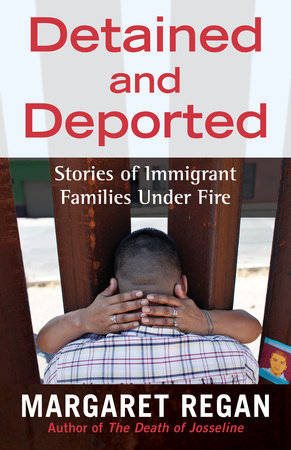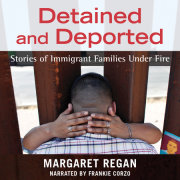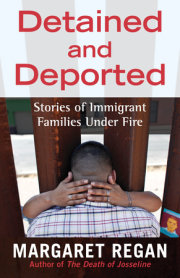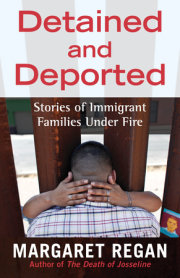From the IntroductionYolanda Fontes sat in her prison scrubs and watched the families gathered all around her. Husbands were reconnecting with wives, sisters with sisters, mothers with children. It was a sunny Sunday in April, and the families had flocked to the Eloy Detention Center, a dreary for-profit immigration prison in rural Arizona, to visit their detained loved ones. A female prisoner sat with her small son on her lap, her arms wrapped tightly around him, as if she were imagining never letting him go. The aunt who had brought the little boy spoke sorrowfully to her sister as the child snuggled in his mother’s embrace. Nearby, an imprisoned father sat across a table from his wife, clutching her hand. They were trying to talk, but their four-year-old daughter, hungry and tired, fussed on the floor below.
None of the families in the packed room had any privacy. An impassive guard presided over their melancholy reunions, keeping a close watch on the mothers and fathers dressed in jailbird scrubs. The visiting room was bleak and windowless, lit by glaring prison lights. It was a beautiful spring day outside, but no rays of sunlight pierced its cinder block walls.
Alone among the detainees in this stark space, Yolanda had no family visiting, just me, a writer who had come to hear her story. She was glad to be out of her prison unit, and she was full of smiles, determined to be cheerful. Yet her tale was grim, and she looked at the other detainees’ kids wistfully as she recounted it. During the two years she’d spent locked up in Eloy, she’d seen her two little girls and her little boy only sporadically. The children, all American citizens, lived in a distant suburb northwest of Phoenix. They came to visit their mom only when a relative or friend could spare the time to drive the two-hundred-mile round trip to Eloy. The last time Yolanda had seen them was two months before.
Yolanda was thirty-two. She’d slipped into Arizona from Mexico seventeen years before, when she was just fifteen. She spoke flawless English and, even though she had no papers, she’d almost never had any difficulty finding a job. And until two years ago, she’d never had trouble with immigration. But the father of her two younger children regularly beat her, and one attack triggered a series of disasters that eventually landed her in jail and now detention.
The abusive ex had the two kids and Yolanda was facing deportation. She could have accepted “removal” to Mexico right away—and gotten out of Eloy—but if she were deported she would lose the children. So she stayed in the prison month after month, fighting her case, hoping to persuade a judge to overturn the deportation order, praying to get back to her daughters and her son.
Yolanda’s spirits flagged just once during the two hours we talked. The last time the kids came to see her, she said, her five-year-old, Little V, had looked at her suspiciously. “He told me I didn’t look like his mother,” she said, her eyes filling with tears. Her own child was starting to forget her.
Down in Nogales, on the Mexican side of the border, Gustavo Sanchez Perez was just as worried about his kids. He was a twenty-five-year-old landscaper from Phoenix; I met him early one hot July morning at a Catholic
comedor just steps from the international line. He was one of sixty deportees eating a hearty breakfast of beans and rice in a humble dining hall run by an order of Mexican nuns. Like Yolanda, Gustavo had moved with his family from Mexico to the United States as a child. Born in Veracruz, he’d come to Phoenix at the age of eight and lived there ever since. He spoke perfect English. He and his wife had two small children, a boy of four and a baby girl, both of them US citizens.
Gustavo had been arrested in Phoenix for riding his bicycle at night without a light and then detained by ICE. He’d rotated through several detention centers, in Arizona and in Colorado, before being tossed back over the border into Nogales. He’d always worked hard to support his children. What was their mother doing now, he wondered, without his wages coming in?
He was staying in a shelter, but he would have to leave soon. Nogales was reeling under a deluge of deportees from the United States, and the town’s shelters didn’t have the resources to house
los deportados longer than three days. Gustavo would have to move on. His mother in Phoenix had advised him to go back to Veracruz, but he had no intention of returning to a place where everyone was a stranger. He knew where he needed to be: with his children, at home, in Phoenix. The way to get back to them lay over the border and through the Arizona desert, but the journey would be perilous in more ways than one. He could die out there in the heat, as so many had done before him. And if he made it through, he ran the risk of arrest. “If they catch me,” he said, “I get ten years in jail.”
Copyright © 2015 by Margaret Regan. All rights reserved. No part of this excerpt may be reproduced or reprinted without permission in writing from the publisher.










